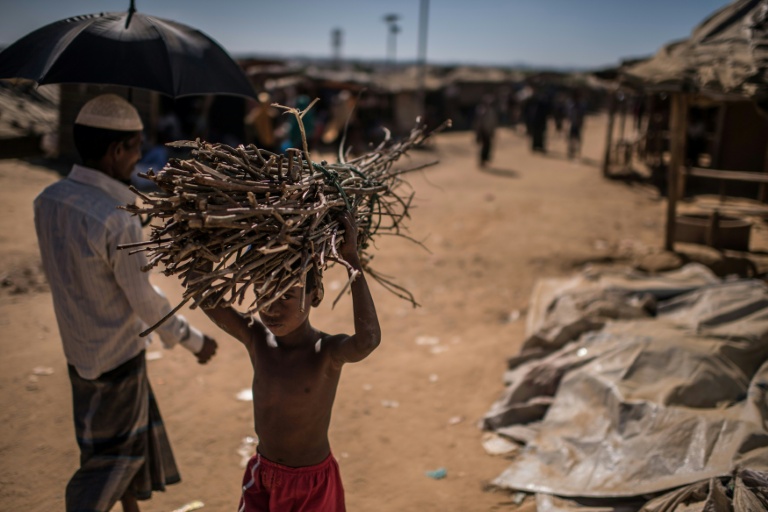World
Bangladesh Confronts Rohingya Refugee Crisis as Influx Continues

The Rohingya refugee crisis continues to deepen as Bangladesh grapples with a surge of new arrivals from Myanmar. Since early 2024, approximately 150,000 Rohingya have fled to Bangladesh, seeking safety from escalating violence in Myanmar’s Rakhine State. The ongoing conflict, exacerbated by a military coup in 2021, has prompted humanitarian discussions in Cox’s Bazar, where officials aim to address the plight of these displaced individuals.
For many, including Mohammad Kaisar, the journey to Bangladesh is a painful memory. In 2017, he escaped his home in Myanmar’s Maungdaw township with his family, crossing the Naf River in a precarious boat. Now 28 years old, Kaisar remains in a refugee camp, surrounded by despair. “How is it possible to return home?” he asked during a recent phone interview with AFP. His words reflect the sentiments of countless others who find themselves trapped in overcrowded camps, facing daily struggles.
Escalating Needs and Humanitarian Challenges
Talks in Cox’s Bazar aim to create stable conditions for the Rohingya’s eventual return to Myanmar. However, the United Nations has cautioned that safety must precede any return. Nicholas Koumjian, head of the UN’s Independent Investigative Mechanism for Myanmar, emphasized that the ongoing violence in Rakhine jeopardizes the possibility of a dignified return for the refugees. “Ending the violence and atrocities against civilians from all communities in Rakhine is critical,” he stated.
The situation in Rakhine has grown increasingly dire, with factional clashes and restricted access to aid leaving many Rohingya in dire need. The World Food Programme reported that 57 percent of families in central Rakhine cannot meet basic food needs. As aid flows diminish, the realities in the camps grow grimmer. Each refugee receives a ration card worth about $12 a month, which buys limited supplies like rice and oil. “It fills our stomachs, but there is no nutrition,” Kaisar lamented, highlighting the challenges faced by families, especially children.
Concerns for the Future
Education presents another pressing concern for the Rohingya community. Kaisar worries for his three-year-old son, contemplating whether he will have opportunities for learning and employment or if he will remain trapped in a cycle of displacement. “Will he be able to study and get a job? Or will he spend his whole life as a refugee like me?” he asked, expressing a sentiment shared by many parents in the camps.
Despite initial kindness from Bangladeshi villagers who offered aid upon their arrival, the long-term outlook for the Rohingya remains bleak. The violence that drove them from their homes continues unabated, with reports of militants attempting to recruit refugees. “We civilians have been continuously betrayed,” Kaisar reflected, expressing frustration over being used as pawns in broader geopolitical conflicts.
Kaisar’s appeal is straightforward: he urges the Bangladeshi government to ease restrictions on education, allowing Rohingya children to attend local schools. “At least allow our children to attend school,” he implored. “If they can stand on their own, maybe their future won’t be as hopeless as ours.”
As discussions in Cox’s Bazar unfold, the international community remains focused on the urgent need for solutions that prioritize the safety and well-being of the Rohingya population. The challenges ahead are significant, but the voices of those affected, like Kaisar, underscore the human impact of policies and decisions made far from the camps.
-

 Politics4 weeks ago
Politics4 weeks agoSecwepemc First Nation Seeks Aboriginal Title Over Kamloops Area
-

 World5 months ago
World5 months agoScientists Unearth Ancient Antarctic Ice to Unlock Climate Secrets
-

 Entertainment5 months ago
Entertainment5 months agoTrump and McCormick to Announce $70 Billion Energy Investments
-

 Science5 months ago
Science5 months agoFour Astronauts Return to Earth After International Space Station Mission
-

 Lifestyle5 months ago
Lifestyle5 months agoTransLink Launches Food Truck Program to Boost Revenue in Vancouver
-

 Technology3 months ago
Technology3 months agoApple Notes Enhances Functionality with Markdown Support in macOS 26
-

 Lifestyle3 months ago
Lifestyle3 months agoManitoba’s Burger Champion Shines Again Amid Dining Innovations
-

 Top Stories2 months ago
Top Stories2 months agoUrgent Update: Fatal Crash on Highway 99 Claims Life of Pitt Meadows Man
-

 Politics4 months ago
Politics4 months agoUkrainian Tennis Star Elina Svitolina Faces Death Threats Online
-

 Sports5 months ago
Sports5 months agoSearch Underway for Missing Hunter Amid Hokkaido Bear Emergency
-

 Politics5 months ago
Politics5 months agoCarney Engages First Nations Leaders at Development Law Summit
-

 Technology5 months ago
Technology5 months agoFrosthaven Launches Early Access on July 31, 2025





















